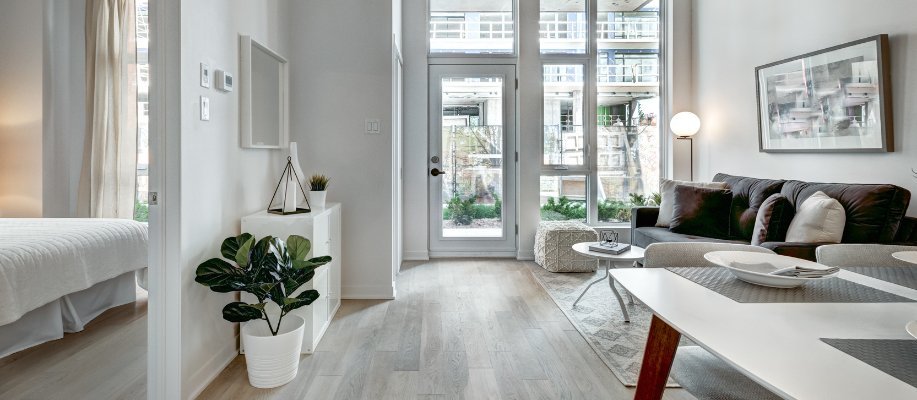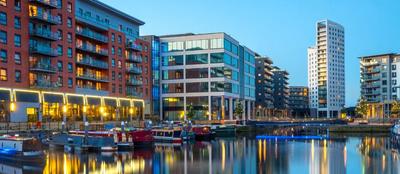
The serviced accommodation property market in the UK is booming. With the rise of Airbnb and other short-term rental platforms, more and more people are looking for alternatives to traditional hotels. This has created a big opportunity for savvy property investors who are looking to cash in on this growing trend.
In this article, we'll list some of the key steps you can follow to start a successful serviced accommodation property business in the UK.
What is serviced accommodation?
Serviced accommodation is a type of short-term rental property that offers amenities and services not typically found in a traditional rental property. These can include services like housekeeping, laundry, concierge, and even breakfast or other meals.
The key difference between serviced accommodation and a traditional rental property is that serviced accommodation is geared towards providing a hotel-like experience for guests. This means that your property must be well-maintained and clean at all times. It's also important to have a good handle on customer service so that you can resolve any issues that may come up during a guest's stay.
A serviced housing unit is commonly designed and marketed to target a certain type of guest depending on a variety of factors such as:
- Location – is it near a university, hospital, HQ of a large company, or a tourist attraction?
- Quality – are the amenities of a low or high standard, and is it spacious to the extent that it's considered a high-end unit?
- Demand – are people eagerly looking for the flexibility of a short-term stay in the area?
- Transport links – are bus and train stations close, and can people park their cars directly outside if they wanted to?
Guests in a serviced accommodation property can include tourists, UK nationals wanting weekend getaways, and professional workers on business trips (whether they stay for a few days, weeks, or months).
By linking your preference of guest profile with the location, quality, demand and nearby transport links to the property, you can start to get a feel for how to position your serviced accommodation investment.
Getting started in the serviced accommodation industry
Now that you understand the basics of serviced accommodation, let's walk through some of the points you need to consider to set up a thriving extended stays business.
1. Start simple with one property
Avoid getting too carried away or excited and build an empire from the get-go. You want to start small and simple, especially if you're new to the industry.
This will allow you to manage your risks a lot easier, in the sense that with one property you can fully test your business model and scale it accordingly depending on what works well or not.
Like any business in a different sector, it's a lot more realistic and practical to think about the "long game" with how you'll build upon your investment to make it profitable. Don't go all in and buy a block of units in the same area unless you've been there and done it before.
If you're working extremely closely with someone who has all the knowledge and experience of serviced accommodation, then follow their lead presuming you can trust them.
A key consideration when buying your first place is to either do it through your own "company" or as an "individual". Each route has its pros and cons. The topic itself warrants a dedicated article. Consider doing your research on this before signing the ownership papers.
2. Find the right location
With the right mindset of keeping your short-term rental business simple to begin with, next you want to find the perfect location.
Your aim should be to choose popular UK area with at least one of the following groups of people:
- Tourists
- Business travellers
- Digital nomads
- Couples
- Affluent families
London is a great option as it is one of the most visited cities in the world. Central London is even better since it ticks all of the boxes above for the guest profiles being there in abundance. However, not everyone has the budget for a property in Zones 1-2.
Other options might include parts of Manchester where big enterprises base their UK staff, and there's not necessarily a good option for their foreign colleagues to stay within walking distance to the office.
Needless to say, seaside towns are a feasible option, particularly for the tourist audience. You can go in all directions around the edge of the UK for that.
3. Choose the right property type
Once you've selected your location, it's time to get the right type of property. Serviced accommodation generally comes in the form of a studio, one-bed, or two-bed apartment.
Perhaps a three-bed apartment or three or four-bed house is available, but there are greater risks that you'll price out the majority of your potential guests and it's unlikely they'll need the extra space unless you're only targetting families.
Assess the demand for the type and size of the property you're exploring.
If you go with the common standard of a studio, one-bed or two-bed apartment, then see how far your money can take you in terms of the quality of property available. Can you get a unit with a concierge, private security, and elevators? Or, is the preference to go for a ground floor flat with a key to enter it directly from the main road?
There's no right or wrong here – it all depends on the guest profile you're planning to occupy it with and how the numbers stack up.
4. furnish your property
Have you ever stayed in a serviced apartment or holiday let with no sofa, bed or TV? If "yes", then this is extremely uncommon!
Most often, temporary rental homes come fully furnished to make the check-in and check-out process as seamless as possible. It's one less headache for the typical short-term tenant or guest.
You'll need to envision what to furnish your place with and how the layout of all rooms with the appliances and amenities will fall into place. After all, this isn't a hotel room you're buying – it will need a kitchen, bathroom, and living area as well as a bedroom or two.
Sticking to a high standard of furnishings is a wise move, particularly because it helps avoid replacing any low-quality, easily damaged furnishings. This is more of a problem if you have a guest staying while this scenario plays out.
Don't forget about amenities and consumables too... Towels, bedding, toiletries, kitchenware, and even tea/coffee and water refills. Guests expect these to be changed or topped up regularly.
5. Set up and execute your marketing strategy
Now that your property is ready, it's time to put your marketing hat on. If you don't have one, you'll either need to put it on someone else's head (i.e. pay someone else to do it for you), or be prepared to get your hands dirty and learn some new skills.
Some property business owners dread this part, while others love it!
There are many ways to market your serviced accommodation company and properties. The obvious ones that stand out are online listing platforms such as Airbnb. Next comes social media including direct advertising via your own channels, and then using areas like groups, marketplaces, and paid advertising.
Don't neglect paid ads and local reviews via search engines as well such as Google and Bing – an often overlooked area that can pay dividends long-term.
Last but certainly not least, descriptive, clear and high-quality photos are an absolute must! Without them, you're wasting your time and energy doing everything else marketing-related...
Set aside some of your budget to take advantage of all these mediums and reach your target audience quickly and effectively.
6. Provide excellent customer service
Many newbie business owners of short-term property rentals mistakenly think of it as passive income – a big mistake.
As profitable as serviced accommodation property can be, it's certainly not passive. Think of all the checking in and checking out of the different guests, the continuous cleaning and maintenance, and the questions and issues they might have (even if it's just about the local area vs. the property).
This all adds up, and although you might be in a position to outsource the bulk of the groundwork, this is your business and it's crucial you provide exceptional services to your guests and tenants from start to finish.
Word of mouth and positive online reviews are invaluable – just one slip-up in customer services can be extremely damaging if the impacted guest wants to share that experience with others.
Remember that your guests pay for convenience and peace of mind, so it's important to go above and beyond to meet their needs. This includes things like providing 24/7 support, being responsive to queries/requests, and offering local tips and advice on things to do in the area.
Conclusion
A serviced accommodation property business is a great way to make money in real estate versus traditional methods like buy-to-let and HMOs.
If you're thinking of starting a short-term rental business in the UK, follow the steps outlined above and you'll arm yourself with the right tactics to deploy for success.
There are many gaps, cracks, and pitfalls you could accidentally jump into along the way. Always be extra cautious from the very initial stages of researching the right properties and locations, to the legalities of running a compliant UK property business.
Nonetheless, the opportunities are endless with the new age of temporary stays and growing demand from guests globally.
Starting out requires you to wear multiple hats or hire a small team across business operations, property expertise, customer service and marketing. It's not for the faint-hearted, but if done right, it could easily offer a faster path to greater property-driven profits in the long run.
Need help finding the right SA investment opportunity? Check out and connect with one or more specialist UK deal sourcers listed with us. Or, use our free property sourcer matchmaker service.






